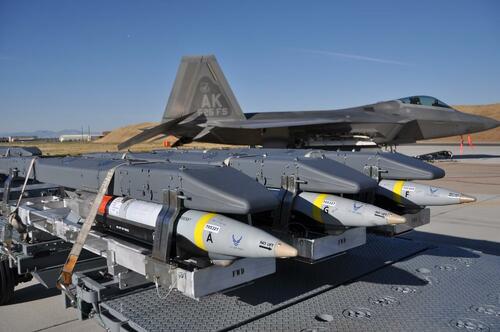US-Made Bombs Used In Deadly Strike On Rafah Tent Camp
A fresh CNN report has concluded that Israel used American-made bombs in Sunday’s attack on a refugee tent encampment in Rafah which killed 45 people, including women and children.
The attack on the displacement camp has driven global outrage also given the grim footage and images which surfaced in the aftermath, including of a headless child. Over 200 more were injured. Israeli leader Benjamin Netanyahu on Monday blamed a “tragic mistake” for the attack, while the Biden administration said it did not cross the president’s ‘red line’.
“Small diameter bombs” via USAF file image
The airstrike happened at a location identified as “Kuwait Peace Camp 1” and resulted in fire rapidly spreading through tents packed with civilians.
“In video shared on social media, which CNN geolocated to the same scene by matching details including the camp’s entrance sign and the tiles on the ground, the tail of a US-made GBU-39 small diameter bomb (SDB) is visible, according to four explosive weapons experts who reviewed the video for CNN,” the report said.
The White House has throughout the conflict refused to place conditions on US weapons transfers, despite growing pressure even within the Democratic party, though it did pause a single ammo shipment. The New York Times has also analyzed bomb fragments from the attack site, and has come to the same conclusion.
According to more from CNN’s analysis:
The GBU-39, which is manufactured by Boeing, is a high-precision munition “designed to attack strategically important point targets,” and result in low collateral damage, explosive weapons expert Chris Cobb-Smith told CNN Tuesday. However, “using any munition, even of this size, will always incur risks in a densely populated area,” said Cobb-Smith, who is also a former British Army artillery officer.
Apparently the munition triggered secondary explosions and fires at the camp, which rapidly spread and burned out of control.
“The warhead portion [of the munition] is distinct, and the guidance and wing section is extremely unique compared to other munitions. Guidance and wing sections of munitions are often the remnants left over even after a munition detonates. I saw the tail actuation section and instantly knew it was one of the SDB/GBU-39 variants,” former US Army senior explosive ordnance disposal team member Trevor Ball described.
The bombs used in the Israeli strike that killed dozens of Palestinians in a camp for displaced people near Rafah were made in the United States, a @nytimes analysis shows.
w/ @robinnyc7 @heytherehaley @whitney_hurst. Link: https://t.co/VEfMTYHoj6 pic.twitter.com/7nsdboBjOU
— Christiaan Triebert (@trbrtc) May 29, 2024
He even pointed to serial numbers from munitions recovered and filmed at the scene which matched those for a manufacturer of GBU-39 parts based in California.
CNN detailed further: “Two additional explosive weapons experts – Richard Weir, senior crisis and conflict researcher at Human Rights Watch, and Chris Lincoln-Jones, a former British Army artillery officer and weapons and targeting expert – identified the fragment as being part of a US-manufactured GBU-39 when reviewing the video for CNN, though they were unable to comment on the variant used.”
This finding is sure to increase the pressure on the White House, which has vehemently denied it is a party to war crimes in Gaza. On Tuesday White House national security spokesman John Kirby called the Sunday mass casualty attack “heartbreaking,” “tragic” and “horrific” – but still said: “As a result of this strike on Sunday, I have no policy changes to speak to.”
GBU-39 small-diameter bomb (SDB) “smart munition” file image
He added in a press briefing: “It just happened. The Israelis are going to investigate it. We’re going to be taking great interest in what they find in that investigation. And we’ll see where it goes from there.” So in the end, the Israeli military is supposedly going to do a thorough investigation of itself.
Tyler Durden
Wed, 05/29/2024 – 14:20


Recent Comments